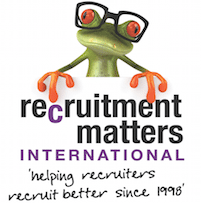Written by RMI’s MD, Ken Kemp with major contributions from two of our trainers, Sarah Gordon & Stewart Stone.
We were recently quizzed by Recruitment Grapevine on the characteristics of great recruiters and some of the traits of the not-so-great. Here’s what two of our trainers, Sarah Gordon & Stewart Stone had to say..
Q1. What characteristics do you think are integral to a great recruiter?
Sarah:-
a) They ‘get’ people and have great emotional intelligence
b) They have a clear “WHY” (as in Simon Sinek’s ‘Start With Why’) – a clear reason for being a great recruiter
c) A constant hunger for learning and development
d) The ability to focus on the goal
Stewart:-
Having recruited over a hundred recruiters a year for many years for a large recruitment business, I benchmarked the psychometric test data to establish the key competencies that made both perm and temp recruiters successful. As you would expect, resilience, communication skills, persuasiveness and team orientation were all up there. Two factors that stood out, though, were that our top consultants all exhibited excellent time management and planning skills, together with a strong sense of pace and urgency.
Q2. What do you think can be a recruiter’s downfall?
Sarah:-
• Busy-ness – working really hard in the wrong area
o As a recruitment trainer, this is the kind of client I love to work with. They have passion, they are prepared to work hard, so simply redirecting their focus can yield really quick results
• Laziness – losing sight of their WHY and going through the motions
o These clients are great to work with too. It can take a little longer to help people discover (or re-discover) their WHY, but once you make the breakthrough, great things tend to happen
• Complacency – thinking they know it all, and that doing what they do now will be enough
o As a recruitment trainer, quite often these are the recruiters that never become clients. Either they aren’t interested in training, or they aren’t prepared to change, so there is no point me working with them. As a trainer, I need to know I can make a difference. For me, it’s not all about the money. My “WHY” is helping recruiters improve and grow
Stewart:-
There are many factors that can be cited here. Certainly not building a strong relationship with candidates either face to face or via Skype from the outset can lead to poor control throughout the process, with counter offers springing up out of the blue. Consultants need to focus more on exceeding the expectations of candidates at every point of contact. Not staying in regular contact, poor feedback post interview and little objective career advice all sour the relationship between candidates and recruiters. Few recruiters put effective aftercare in place and miss out on subsequent business development opportunities
Q3. Why do they need to possess the characteristics from Q1?
Sarah:-
a) Recruitment is all about people – successful businesses are made up of successful and motivated people and, despite the increasing use of assistive technology and AI, people make business decisions for emotional reasons. Tech doesn’t understand caution, fear, suspicion, passion, ambition, excitement, trust or loyalty. Great recruiters do.
b) Recruitment is hard work. It’s a vocation that usually requires you to work at least some evenings and weekends, and to deal with rejection on a regular basis. You may make some people’s dream jobs a reality, but you will also have to tell people that their dream job is not going to happen for them this time. If you don’t have a strong motivator behind why you are doing what you are doing, it can be hard to stay positive. That’s why so many people can’t cut it in recruitment and leave the industry – they didn’t have a strong enough reason to stay.
c) Our world is constantly changing. Without a passion for learning and keeping your skills and knowledge up to date, you will get left behind. This is true for most careers, but in the world of recruitment you have to stay on top of developments that affect recruitment (legislation and compliance, equality and inclusion, sales and marketing, social media, employer branding, candidate experience, technology and communications, operational efficiency, labour market trends) but on top of that you need to stay abreast of all the key developments affecting your specialist market. If you want to stay a trusted advisor to clients and candidates in your sector, you need to invest in becoming a true expert.
d) There is so much ‘white noise’ in our daily lives – digital and otherwise – so successful recruiters need to be able to keep focus on their goals and avoid distraction. A clear understanding of what they need to do to fulfil their “WHY” and consistently doing those things before doing anything else each and every day differentiates the best recruiters from those who ‘bump along the bottom’ year after year.
Stewart:-
This is still very much a people business and clients will buy from individuals who are able to quickly build rapport and genuinely want to build long term business relationships. However, to be ultimately successful, consultants need to plan and review their working day properly, checking progress and re-prioritising throughout the day. They need to work quickly and effectively, focussing on those roles and candidates that are most likely to generate revenue, working to achievable KPIs and running their desk as a distinct business unit, and taking pride in it accordingly.
So, do you agree with our trainers’ comments on great recruiters? I’d be fascinated to have your take on this, too. Please email me info@recruitmentmatters.com. .


